Vegan Fashion: A Growing Trend in the Fashion Industry
As awareness of animal rights and environmental protection continues to grow, more consumers are opting for vegan alternatives to traditional fashion products. Vegan clothing refers to items that have been produced without using any animal products or by-products such as leather, wool, silk, fur or down.

The Rise of Cruelty-Free Clothing
As awareness of animal rights and environmental protection continues to grow, more consumers are opting for vegan alternatives to traditional fashion products. Vegan clothing refers to items that have been produced without using any animal products or by-products such as leather, wool, silk, fur or down. Once a niche segment, vegan fashion is gaining mainstream recognition from both designers and shoppers alike.
Many established fashion houses have launched dedicated vegan lines in response to demand. Large omnichannel retailers have expanded their selections of vegan shoes, bags and accessories. New brands creating entirely animal-free collections have also emerged. Statistics show Vegan Fashion sales increasing by double-digit percentages each year. Its proponents believe this growing market signals a positive trend towards more compassionate and sustainable practices in the industry.
Fabrics Going Fur, Leather and Down-Free
One of the most visible aspects of vegan fashion is the replacement of conventional animal-derived fabrics. Leather alternatives made from plant-based, synthetic or recycled materials have proliferated. Popular choices include mushroom, pineapple and cork leather. Faux fur created from faux mink, modacrylic or other man-made fibers provides an option without the use of real animal pelts.
Down filler in coats and jackets has been swapped for innovative vegan insulations. Some utilize technology to replicate the loft and warmth of goose or duck down. Others utilize natural plant-based materials like kapok fiber. Wool has found suitable substitutes from plant fibers like bamboo, coconut, soy and Tencel. Even silk has dupes formulated without harming silkworms. These fabric innovations allow vegans full participation in the latest trends.
Ethical Labor and Supply Chain Standards
Beyond just removing animal inputs, many vegan brands commit to fair treatment of human workers as well. They may adhere to fair wage practices and prohibit excessive overtime along production pipelines. Child labor is disallowed and health and safety standards enforced. Natural resource usage is optimized through sustainable farming, minimal water consumption and renewable energy.
Waste is reduced via closed-loop manufacturing and initiatives to give post-consumer textiles new life through upcycling. Transparency about suppliers is prioritized so customers know their purchases uphold ethical labor policies. Overall, Vegan Fashion brands aim for holistic sustainability covering environmental as well as social impacts. Through conscientious operations, they demonstrate how compassion need not compromise on quality, style or profitability.
Focus on Cruelty-Free Cosmetics and Accessories
While apparel leads the category, vegan options have widened across various beauty and accessory categories. Cosmetic companies formulate makeup, skincare and haircare free of animal-testing and ingredients derived from animals. Popular vegan beauty brands infuse plant oils and botanical essences for potent formulations.
Accessory designers create vegan versions of standard items like belts, bags, shoes, hats and jewelry without use of animal parts, secretions or by-products. Examples encompass faux patent leather bags, cork wallets and bamboo fiber sneakers. Even manufacturers traditionally reliant on animal materials participate, driven by financial prospect of untapped vegan consumer market. Both cosmetics and accessories serve to complete cruelty-free wardrobes.
Growing Community and Awareness Drives Market Momentum
The rise of social media significantly aids promotion of vegan lifestyle ideals including fashion. Hashtag campaigns, influencer marketing and dedicated accounts help vegan brands connect with their target audience and fuel purchases. Simultaneously, discussion around animal rights and environmental protection on these platforms spreads knowledge that builds empathy toward vegan causes.
Festivals, meetups and organized advocacy events further community bonding and new convert recruitment. Mainstream documentaries drawing attention to industrialized animal agriculture add gravity that motivates lifestyle changes including discretionary spending habits. Colliding trends of health consciousness and sustainable living also play roles in vegan fashion gaining serious traction. Taken together, energized communities and raised awareness provide the momentum keeping this conscientious nichesector growing at a sustained clip.
Future for Vegan Fashion Industry
Experts forecast fashion poised for long-term viability and expansion. As millennial and Generation Z demographics driving current growth come of prime spending age, their influence will cement changes within the overall industry. More designers and retailers will cater to this powerful audience segment either through dedicated collections or expanded vegan selections.
Innovation will continue diversifying fabric and material options away from traditional animal derivatives. Technology assists imitation becoming more sophisticated and affordable. Greater supply chain accountability achieves higher standards throughout complex global production networks.
With established infrastructure and rising popularity, vegan brands stand ready to scale up as the market expands. Their variety, style and competitive pricing already attract both principled vegans and the simply curious. As ethical values resonate more broadly, fashion has potential to progress from niche to mainstream. If current trajectories hold, its footprint industry wide will increase substantially over the coming decades.
Get more insights on Vegan Fashion
Unlock More Insights—Explore the Report in the Language You Prefer
About Author:
Ravina Pandya, Content Writer, has a strong foothold in the market research industry. She specializes in writing well-researched articles from different industries, including food and beverages, information and technology, healthcare, chemical and materials, etc. (https://www.linkedin.com/in/ravina-pandya-1a3984191)












